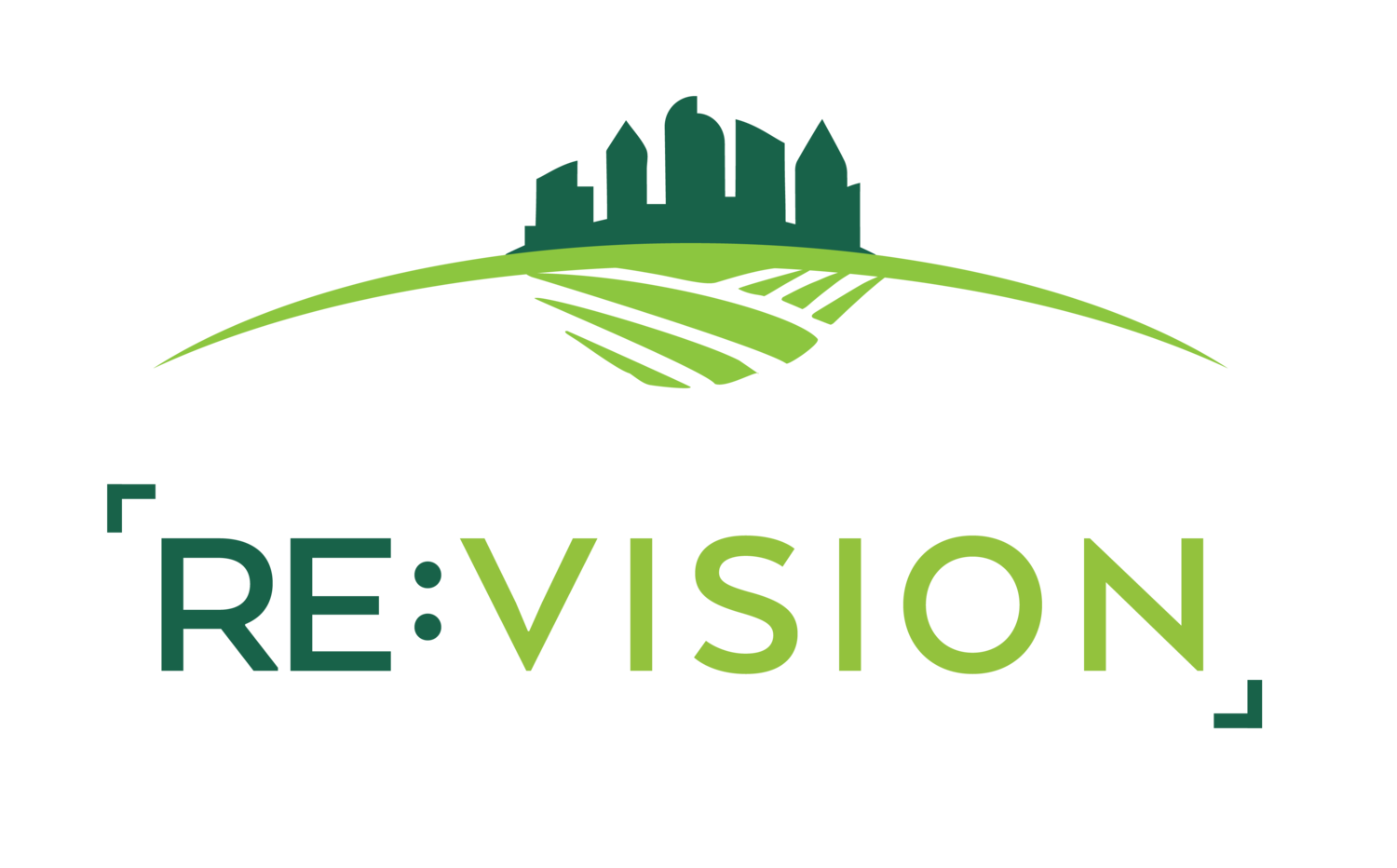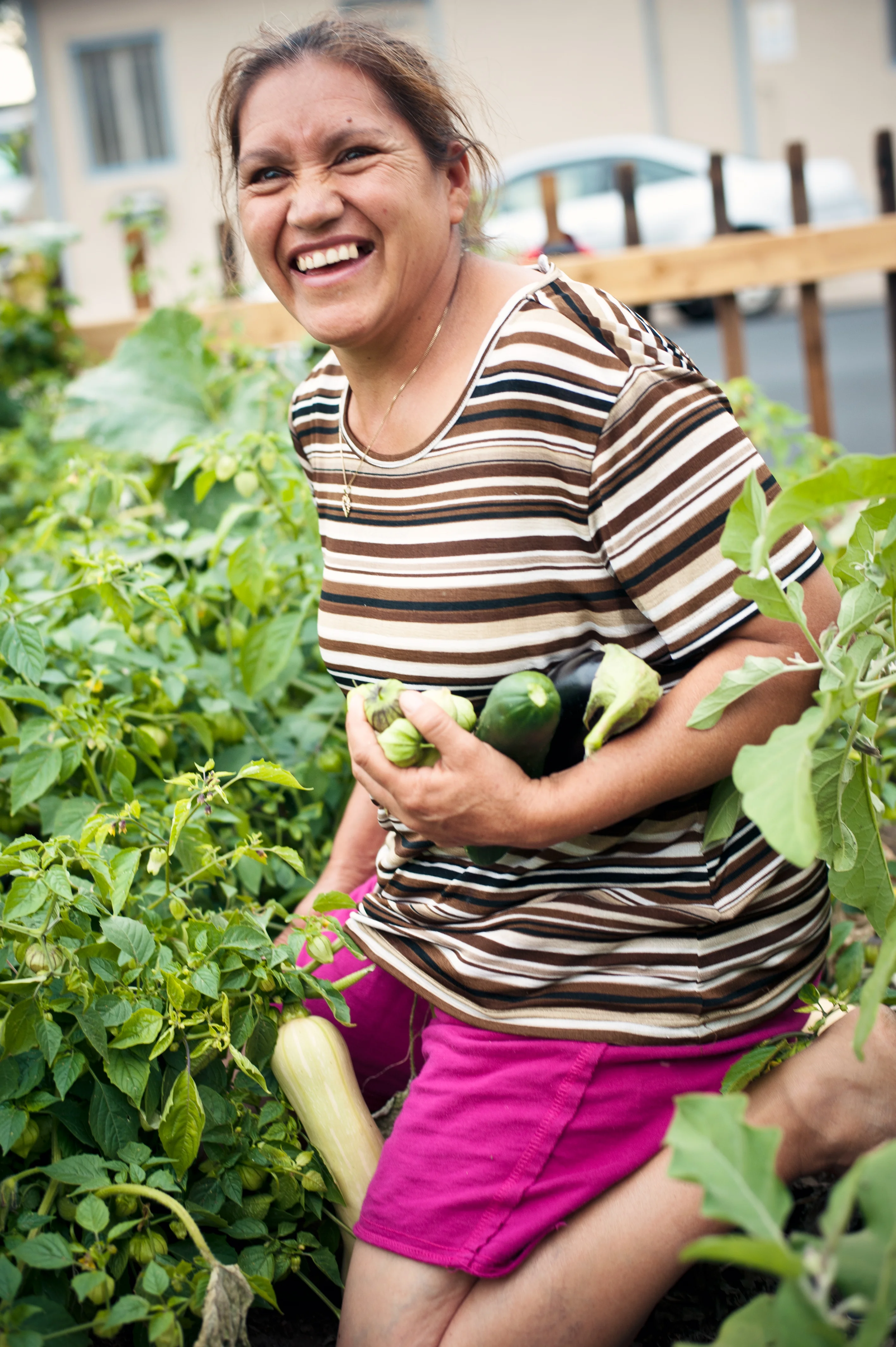
Re:Write
STORIES FROM THE FIELD, PROMOTORA RECIPES, AND CO-OP DEVELOPMENT LESSONS (PLUS SOME POLITICS AND HUMOR, TOO)
Custom Re:farm Denver Gardens Now Available!
Have you ever wanted to start gardening but just don't know how to start? Or perhaps you know how to start or what to do once things are going, but you just can't seem to find time until June to get started - we understand! Through our new program, we're building on our home gardening expertise (to date, Revision has established over 200 backyard gardens!) and helping folks like you get a jump-start into gardening!
We'll come and build you either a raised-bed or in-ground garden, amend your soil, plant it with seeds (April) or seeds and transplants (May), install a custom drip irrigation system on a digital timer and get some trellises set and ready to go. All you need to do is tend to a little weeding and watering, and you will be enjoying a bountiful harvest this summer!
Not only will you receive a custom garden, you will be directly supporting a low-income family to have a garden of their own through our Re:farm Denver program. In addition, you're garden will provide fair-wage jobs for hard-to-employ community members in Denver's most under-served neighborhoods.
For pricing and more information, click here to download a brochure. We look forward to working with you to grow a healthier future together!
Colorado GMO Labeling Bill - Update
On February 21st, 2013, the Colorado House Health, Insurance and Environment Committee voted down HB 13-1192, which would have required the mandatory labeling of food and food products containing or made from genetically modified organisms (GMOs) and genetically engineered (GE) foods. The bill was sponsored by Representative Jeanne Labuda (D-Dist.1) and widely supported by consumer, farmer and health advocates and non-GE farmers, food producers and businesses.
Although California failed last November to become the first state to initiate legislation that would require labeling, 18 states are considering similar measures.
While Senator Labuda knew that it was an uphill battle, she had public opinion on her side – national polling consistently shows that 90% of Americans want consumer labels to explicitly state when food contains GMOs. “I appreciate the supporters who came to testify on behalf of this bill. It shows the widespread support in Colorado for labeling of GE foods,” said Representative Jeanne Labuda. “It’s a huge step in the right direction to give consumers the right to know.”
Despite the overwhelming public support for this measure, large agribusiness has poured millions of dollars to fight labeling, and to convince the public that GMOs are harmless. Monsanto alone poured an estimated $45 million dollars to help defeat the California bill.
The public hearing for HB 13-1192 was standing room only as people from both sides of the issue came to testify. Those that spoke in opposition to the bill included the Wheat Growers Association, the Corn Growers Association, Colorado Farm Bureau, and the Grocers Association. Opponents cited several common themes: GMOs have not been proven to have harmful side effects, and mandatory labeling would drive up costs that would eventually be paid for by consumers.
Proponents argued that labeling would not drive up costs significantly. One witness cited a study that showed the annual increase in cost would be no more than $5 per consumer. Other proponents argued that GMOs have not been proven safe, and that the FDA and other agencies have not had adequate time or resources to conduct long-term studies on GMOs. The FDA, for instance, has not conducted any independent studies; all studies to date have been industry funded.
While cost and safety are important, there is too little information at this date to legislate on these positions alone. The crux of the matter in this debate, and the one that carries the most weight, is the freedom of consumer choice. People have repeatedly declared that they want to know more about their food – whether it contains transfats, artificial sweeteners, or GMOs. Labeling laws already require the disclosure of information such as if a product contains milk or soy, or if it was processed in a facility that processes nuts. GMOs are the next step in more transparency in our food system, allowing consumers to make informed decisions.
"The death of HB 1192 is not only a defeat for basic consumer rights, but it hurts Colorado's family farmers and ranchers who work hard to maintain strong relationships with their customers," said Dan Hobbs, a farmer from Avondale and a Rocky Mountain Farmers Union spokesperson. “Giving consumers more transparency about how their food is produced will return a little bit of fairness to our agricultural markets and give small and midsized farmers a fighting chance to stay in business through alternative market systems. After all, if a seed is unique enough to patent, it is unique enough to label."
By providing information to the consumer, the free market will decide whether or not there is consumer fear or concern around GMOs. By withholding information from the consumer, (and by pouring money into misleading ad campaigns and one-sided research) agribusiness companies are not only distorting the marketplace, but they are subverting our democracy.
For general more info about GMOs, check out Organic Consumers Association and Food and Water Watch. For an in-depth report on the issue, we recommend reading GMOs Myths and Truths.
Click here to listen to an audio version of Revision International’s Executive Director testifying at the State Capitol.
Promotoras - Agents of Change
At the heart of Revision’s work to create sustainable and self-sufficient communities is the understanding that residents are the greatest resource to lead this transformation. Revision’s promotora model is this belief in action. Residents who demonstrate passion for changing their community are given the tools, training, and support to become promotoras, who promote public health initiatives in their community.
Promotoras are the backbone of Revision’s backyard garden program. They educate the community about the relationship between food and health. They promote the backyard garden model as a way for low-income families to learn how to grow healthy food and change their diet, providing a hand up rather than a hand out.
But beyond that, promotoras develop deep relationships within the community. They work to connect with each family, and then connect those families together. In doing so, they build a network that has the ability to mobilize the community to take action.
Recently, Revision’s promotora model has gained the attention of universities, hospitals, public health agencies, and city government, whom all recognize that changing a community has to come from within. Building trust from the outside and engaging residents is difficult work and it takes time, something that most organizations don’t know how to do well. So the promotoras are working with these agencies and stakeholders to engage the community.
Starting this spring, promtoras will be working with Denver Public Health to implement several of the Denver Moves strategies to increase walkability/bike-ability of Southwest Denver. Promotoras will be helping create community ownership of the first new park to be built in Westwood in over 40 years, as well as helping to create Denver’s first bike boulevard!
For the past couple of months, promotoras have been partnering with Fresh Takes Kitchen, a new social enterprise offering healthy, affordable, fresh prepared meals to the southwest Denver community. Read more about Fresh Takes here.
From health and nutrition, to public work improvements, Revision’s promotoras are leading the way!
Click here for more information on how you can support Revision’s promotoras program.
Cultivating Community, Planting Seeds
If you’ve followed our blog, you know that we have been starting seedlings in preparation for our upcoming gardening and farming season. This season is our biggest year yet as we plan on reaching 200 backyard gardens!
Only 4 short years ago, we launched Re:farm Denver and planted our first gardens – 7 of them to be exact. The success of our model is based on two key principles: (1) we support families to grow their own food by providing resources and ongoing technical support, and (2) we hire and train residents from the community to become promotoras and empower them to drive the program.
As we speak, promotoras are meeting one-on-one with families to explain the program and help them plan their gardens – what they want to eat, healthiest choices, and what is best suitable for their space. After promotoras complete a site visit and make a garden plan, we bring in nutrient-rich compost to feed and improve soil quality. We then help each family install a water efficient drip-irrigation system controlled with an automatic timer. Later this spring, promotoras will deliver plants and seeds and help each family plant their garden!
New this year, Revision is excited to announce a limited number of gardens for sale! We are exploring the concept of a “one-for-one” model where a family that can afford to pay for a garden will help offset the cost of a low-income family’s garden.
Please check back for more information, or contact us here.
Kidney Failure, Diet, and Race
Kidney failure is frequently associated with diet; unfortunately, Revision works in a community where diet-related illness is above average. Hispanics are also at a higher risk for kidney failure – in fact, according to the Journal of the National Medical Association, Hispanics are twice as likely to develop kidney failure than non-Hispanic whites, largely due to the increased prevalence of diabetes in the Hispanic population. Additionally, Hispanic patients are less likely than the general U.S. population to be screened for risk factors for kidney disease or receive optimal treatment after diagnosis.
It is for these reasons and more that Revision is proud to announce its newest corporate partner, DaVita. DaVita is a leading provider of kidney care in the United States, delivering dialysis services to patients with chronic kidney failure and end stage renal disease. DaVita strives to improve patients’ quality of life by innovating clinical care, and by offering integrated treatment plans, personalized care teams and convenient health-management services.
DaVita's Community Care is comprised of four essential components:
- Building a Community
- Building the Greatest Healthcare Community the World Has Ever Seen
- Being a Role Model for American Health Care
- Sending Forth Ripples of Citizen Leadership
First and foremost, DaVita would rather prevent disease than treat it, which is why they are sponsoring Revision’s programs that will lead to a healthier community!
Thank you DaVita!
Fishing Poles
We are all familiar with the well-traveled parable: “Give a man a fish, and you feed him for a day. Teach a man to fish, and you feed him for a lifetime.” But how often do we actually carry this out in the way that we view charity, the way that we approach cycles of poverty both locally and abroad? This may be easy to do on a small scale, but how do we succeed in doing it on a broad scale? And even if you teach a man to fish, he cannot fish without a fishing pole.
We are intentional about teaching people to create their own ‘fishing poles’ – that is, creating the means and resources to provide for themselves and their communities.
Transforming Families, Transforming Communities
In 2009, we began teaching families how to grow food in their own backyard in order to feed their family healthy, fresh, organic food. For most of these families, this is the only way that they can afford to eat healthy, the only way they can feed their children organic produce. We started in the Westwood neighborhood, nestled in Southwest Denver and the home to most of our family gardeners. Westwood is food desert, meaning the residents have no grocery store in their community. This, coupled with their modest economic resources, translates into an unhealthy diet. A 2009 study of the neighborhood found that 76% of adults were either overweight or obese.
From seven families in 2009, to 87 in 2011, our program more than doubled every single year. In return for providing families with the resources and technical support to feed their family, we ask that they pay the gift forward and refer another family to join the program.
In 2012 we helped 168 families learn how to grow their own food and feed their family. Over 90 percent of these families live on less that $15,000 a year – which is abject poverty. But because of our program, over 16,000 pounds of organic produce was grown this year in a community that has zero healthy food options.
But these numbers alone do not tell the real impact that our work has. Based upon data collected from 160 families this year:
- 93% said that they eat more fruits and vegetables
- 94% eat fresher food/less packaged food
- 96% cook at home more
- 84% eat more organic food
- 84% eat less fast food
This data shows that Revision’s model is having an immediate and measurable impact on a community that has the highest rate of obesity in children under the age of 18, in a community where the average household income is 50% less than the average Denver household, and in a neighborhood where this is no healthy fresh food.
The success of this program has been rapid. After 4 short years, we have built a critical foundation for a community to change. We have cultivated leaders from within, offering them a better life and new opportunities. We have helped guide a community to develop their own food system – through the production and distribution of healthy food, and through the education and job creation that encompass it. We are not just growing gardens. We’re growing community. We’re not just cultivating food. We’re cultivating potential.
And we're not content to let it rest at potential. Starting in 2013, Revision will coalesce all the momentum in the neighborhood so far - over 200 gardening families, 2 urban farms, the beginnings of a meaningful food distribution framework, and ever-deepening education - into a community-owned cooperative. This would be a separate entity, owned, led, staffed, and managed by community residents themselves. This cooperative, over a transition period of a few years, will provide economic opportunity, enhance the existing community resources, facilitate the production and distribution of food by, and for, the community, and increase the access to healthy food in a food desert. In 2013 Revision will begin by holding community meetings, recruiting and training a co-op board of directors comprised mostly of residents, and bringing together experts in cooperative development to aid in establishing a sustainable business plan and operating framework.
We'll keep you updated on the progress of the cooperative development throughout the year on this blog, so stay tuned!







